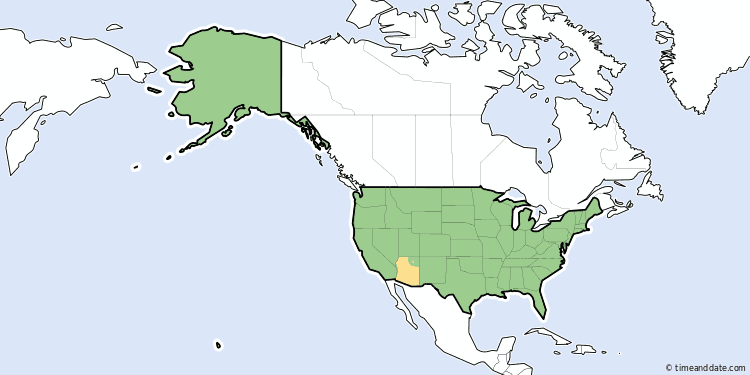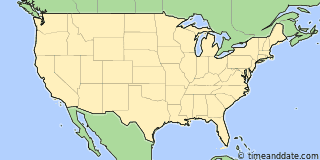Nov 3, 2024, 2:00 am
| Country: | United States |
|---|---|
| Long Name: | United States of America |
| Abbreviations: | US, USA |
| Capital: | Washington DC |
| Time Zones: | 7 (Main Country) |
| Total Time Zones: | 12 (with dependencies) |
| Dial Code: | +1 |
Mar 14
Forward 1 hour
Mar 14, 2027 - Daylight Saving Time Starts
When local standard time is about to reach
Sunday, March 14, 2027, 2:00:00 am clocks are turned forward 1 hour to
Sunday, March 14, 2027, 3:00:00 am local daylight time instead.
Sunrise and sunset will be about 1 hour later on Mar 14, 2027 than the day before. There will be more light in the evening and less light in the morning.
Also called Spring Forward, Summer Time, and Daylight Savings Time.
Nov 7
Back 1 hour
Nov 7, 2027 - Daylight Saving Time Ends
When local daylight time is about to reach
Sunday, November 7, 2027, 2:00:00 am clocks are turned backward 1 hour to
Sunday, November 7, 2027, 1:00:00 am local standard time instead.
Sunrise and sunset will be about 1 hour earlier on Nov 7, 2027 than the day before. There will be more light in the morning and less light in the evening.
Also called Fall Back and Winter Time.
When Does DST Start and End in the US?
Daylight Saving Time (DST) in most of the United States starts on the second Sunday in March and ends on the first Sunday in November.
Which States and Federal Districts use Daylight Saving Time in 2027

Areas in United States on standard time all of 2027
DST in States and Federal Districts in USA in 2027 | |||||
|---|---|---|---|---|---|
| Alabama | Mar 14 – Nov 7 | Kentucky | Mar 14 – Nov 7 | Ohio | Mar 14 – Nov 7 |
| Alaska | Mar 14 – Nov 7 | Louisiana | Mar 14 – Nov 7 | Oklahoma | Mar 14 – Nov 7 |
| Arizona (northeast) | Mar 14 – Nov 7 | Maine | Mar 14 – Nov 7 | Oregon | Mar 14 – Nov 7 |
| Arizona | No DST | Maryland | Mar 14 – Nov 7 | Pennsylvania | Mar 14 – Nov 7 |
| Arkansas | Mar 14 – Nov 7 | Massachusetts | Mar 14 – Nov 7 | Rhode Island | Mar 14 – Nov 7 |
| California | Mar 14 – Nov 7 | Michigan | Mar 14 – Nov 7 | South Carolina | Mar 14 – Nov 7 |
| Colorado | Mar 14 – Nov 7 | Minnesota | Mar 14 – Nov 7 | South Dakota | Mar 14 – Nov 7 |
| Connecticut | Mar 14 – Nov 7 | Mississippi | Mar 14 – Nov 7 | Tennessee | Mar 14 – Nov 7 |
| Delaware | Mar 14 – Nov 7 | Missouri | Mar 14 – Nov 7 | Texas | Mar 14 – Nov 7 |
| District of Columbia | Mar 14 – Nov 7 | Montana | Mar 14 – Nov 7 | Utah | Mar 14 – Nov 7 |
| Florida | Mar 14 – Nov 7 | Nebraska | Mar 14 – Nov 7 | Vermont | Mar 14 – Nov 7 |
| Georgia | Mar 14 – Nov 7 | Nevada | Mar 14 – Nov 7 | Virginia | Mar 14 – Nov 7 |
| Hawaii | No DST | New Hampshire | Mar 14 – Nov 7 | Washington | Mar 14 – Nov 7 |
| Idaho | Mar 14 – Nov 7 | New Jersey | Mar 14 – Nov 7 | West Virginia | Mar 14 – Nov 7 |
| Illinois | Mar 14 – Nov 7 | New Mexico | Mar 14 – Nov 7 | Wisconsin | Mar 14 – Nov 7 |
| Indiana | Mar 14 – Nov 7 | New York | Mar 14 – Nov 7 | Wyoming | Mar 14 – Nov 7 |
| Iowa | Mar 14 – Nov 7 | North Carolina | Mar 14 – Nov 7 | ||
| Kansas | Mar 14 – Nov 7 | North Dakota | Mar 14 – Nov 7 | ||
DST in Other Locations in USA in 2027 (1 Location) | |
|---|---|
| Palmyra Atoll | No DST |
Which States Don't Use DST?
Most of Arizona and Hawaii don't use DST. Indiana introduced DST in 2006.
Daylight Saving Time in Dependencies of USA
| Dependency | Type | Daylight Saving Time Period |
|---|---|---|
| American Samoa | Unincorp. unorg. territory | No Daylight Saving Time |
| Guam | Unincorp. org. territory | No Daylight Saving Time |
| Northern Mariana Islands | Unincorp. org. territory | No Daylight Saving Time |
| Puerto Rico | Unincorp. org. territory | No Daylight Saving Time |
| US Minor Outlying Islands | Territory | No Daylight Saving Time |
| US Virgin Islands | Unincorp. org. territory | No Daylight Saving Time |
US dependencies do not use Daylight Saving Time (DST).
Daylight Saving Time History in United States
- United States first observed Daylight Saving Time in 1918.
- United States has observed DST for 107 years between 1918 and 2024 (DST in at least one location).
- See Worldwide DST Statistics
DST in the USA Today
Daylight Saving Time (DST) in the USA starts on the second Sunday in March and ends on the first Sunday in November. The current schedule was introduced in 2007 and follows the Energy Policy Act of 2005.
According to section 110 of the act, the US Department of Transportation (DOT) governs the use of DST. The law does not affect the rights of the states and territories that choose not to observe DST.
Confusing DST Rules
Historically, there were no uniform rules for DST from 1945 to 1966. This caused widespread confusion, especially in transport and broadcasting. The Uniform Time Act of 1966 aligned the switch dates across the USA for the first time.
Following the 1973 oil embargo, the US Congress extended the DST period to 10 months in 1974 and 8 months in 1975, in an effort to save energy.
After the energy crisis was over in 1976, the DST schedule in the US was revised several times. From 1987 to 2006, the country observed DST for about 7 months each year.
